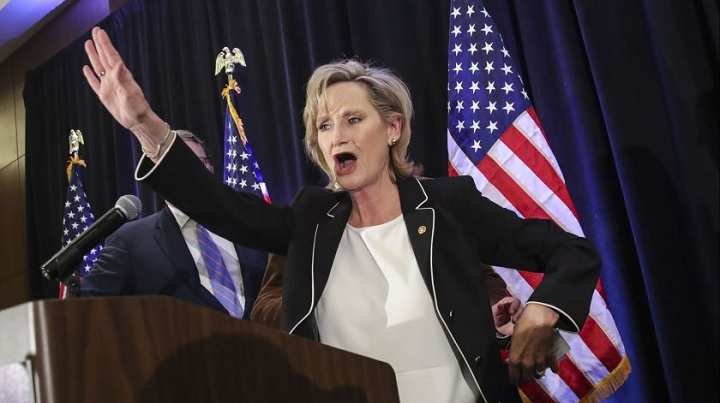Senator Cindy Hyde-Smith Call For Review on IRS Treatment of Religious Nonprofit Organizations Seeking Tax-Exemption

Thirteen Republican congresspersons, drove by Jim Lankford of Oklahoma and Ben Sasse of Nebraska, asked the Internal Revenue Service Tuesday to survey how it gauges tax-exemption applications for religious nonprofits.
The representatives say there was an “evident disappointment of value controls” when the IRS initially denied, and afterward under open investigation endorsed, a nonprofit assignment for the Christians Engaged religious organization situated in Garland, Texas.
That gathering got an “unfriendly choice” in view of its self-portrayed mission to urge devotees to appeal to God for the country, vote in races, and lock “in some type of political training or activism.”
In the disavowal letter gave on May 18, the IRS expressed Christians Engaged was ineligible for the nonprofit assignment known as “501(c)(3) status” to a limited extent since “Book of scriptures lessons are commonly associated with the [Republican] party and competitors.”
The disavowal letter, endorsed by IRS worker Stephen A. Martin, head of the Exempt Organizations Unit’s Rulings and Agreements area, expressed the gathering works “for a generous non-excluded private reason and for the private interests” of the GOP.
“Specialists are prepared to handle applications in a nonpartisan style, bereft of governmental issues or specialists’ very own convictions, and with adherence to the law and current realities of every application,” the congresspersons kept in touch with Treasury Inspector General J. Russell George.
The letter added, “In view of this interaction, our anxiety for the impartial and deferential thought, everything being equal, especially for those with a religious or religious mission considering the apparent aggression toward Christians occupied with the IRS’ proposed unfriendly assurance letter, has developed. Guarantee that the different advances the IRS recognized, including layers of “value control” survey, are in reality dependent on law and truth, and missing superfluous and improper editorial. As an organization inside the national government, the IRS should take care to guarantee no choices depend on predisposition possibly in support of a political or religious perspective.”
The administrators need Mr. George to “completely depict the interaction and layers of survey” included when the Exempt Organizations branch assesses applications and issues dissents. They likewise need divulgence of the preparation gave to IRS workers who take an interest in the assurance interaction, and “regardless of whether a specific accentuation is set on common and Constitutional rights during such preparing.”
The congresspersons asked Mr. George to uncover “any remediation or approvals measures that the IRS has set up if the survey interaction falls flat, including when judgments are given with one-sided, improper, or superfluous editorial,” and how the cycle fizzled on account of Christians Engaged.
At last, they need to have “suggestions on ways the IRS can work on its cycles, methodology, surveys, correspondence, and preparing in regards to conclusions of tax-absolved status for candidate organizations,” and for further developing IRS correspondence with such gatherings.
As per a news delivery, Lankford and Sasse were joined by individual Republican Sens. Kevin Cramer of North Dakota, John Barrasso of Wyoming, Mike Braun and Todd Young of Indiana, Steve Daines of Montana, Jim Inhofe of Oklahoma, Rick Scott and Marco Rubio of Florida, Tim Scott of South Carolina, Jerry Moran of Kansas and Cindy Hyde-Smith of Mississippi.
Today, U.S. Representative Cindy Hyde-Smith (R-Miss.) alongside a few of her partners sent a letter asking the U.S. Depository Department on how the Internal Revenue Service handles tax-excluded status applications from religious organizations.
Sen. Hyde-Smith expressed via online media that it isn’t inside the job of the IRS to deny public advantages to organizations based on its religious association.
The letter addressed to Treasury Inspector General J. Russell George demands a survey of IRS measures for making tax-absolved status conclusions, and the clear disappointment of office quality controls on account of Christians Engaged, a nonprofit religious organization.
“Holy places and religious organizations, in the same way as other beneficent organizations, fit the bill for exemption from government annual tax under IRC Section 501(c)(3) and are by and large qualified to get tax-deductible commitments,” The Senators composed.
“In any case, ongoing occasions encompassing the assurance of tax-excluded status of Christians Engaged has concentrated on the cycles and systems the IRS utilizes while deciding if a religious organization ought to be conceded tax-absolved status, while at the same time creating expansive worry over the norm of the IRS’s unbiased and conscious thought of such applications,” the letter proceeded.
The Senators ask the Treasury Inspector General to survey and write about the IRS’s present audit cycles and techniques for making tax-absolved status judgments. They request a few things to be remembered for the report, for example:
- Full depiction of the cycle and layers of audit the IRS Exempt Organizations unit follows when making judgments and giving proposed unfriendly assurance letters.
- Depiction of the preparation gave to IRS work force who partake in tax-excluded status assurance choices or draft, related assurance correspondence. Any data on whether a specific accentuation is put on common and Constitutional rights during such preparing. Likewise remember data for how regularly the preparation is given and regardless of whether preparing is diverse for specialists at the administration level or more.
- Portrayal of how the IRS assesses its own audit cycle to decide its prosperity. If it’s not too much trouble, likewise incorporate any remediation or assents measures that the IRS has set up if the survey cycle falls flat, including when judgments are given with one-sided, improper, or superfluous analysis.
- Distinguishing proof of why the cycles and methodology that include various layers of value control surveys, including to guarantee that superfluous critique is excluded, fizzled in the proposed antagonistic assurance of Christians Engaged’s application, in which the IRS included what many would consider to be unseemly and hostile regulating and political analysis.
- Making proposals on ways the IRS can work on its cycles, strategies, audits, correspondence, and preparing in regards to conclusions of tax-excluded status for candidate organizations, just as IRS correspondence with such organizations.
“Guarantee that the various advances the IRS recognized, including layers of ‘value control’ survey, are surely founded on law and reality, and missing incidental and improper critique. As an office inside the central government, the IRS should take care to guarantee no choices depend on inclination possibly in support of a political or religious perspective,” the Senators wrote in the letter.
Congresspersons John Barrasso (R-Wyo.), Mike Braun (R-Ind.), Kevin Cramer (R-N.D.), Steve Daines (R-Mont.), Jim Inhofe (R-Okla.), Jerry Moran (R-Kan.), Marco Rubio (R-Fla.), Rick Scott (R-Fla.), Tim Scott (R-S.C.), and Todd Young (R-Ind.) additionally marked the letter.
Read The Letter
